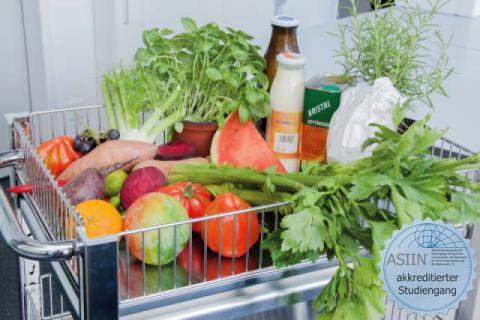From Farm to Fork
Few goods are as important to us in our daily lives as food and drinks, and few goods are as complex to produce. Even the most common foodstuffs require a long and often global chain of production to go from field to plate: from the manufacturing, processing and refinement of raw materials to marketing, sales and the eventual consumption of the final product.
The Food Science M.Sc. programme focuses primarily on the study of this fascinating chain of production and its complex interactions within the context of the value chain. Through a variety of interdisciplinary approaches and perspectives you‘ll study foodstuffs not merely as consumable products, but rather within the sophisticated framework of the underlying, cross-disciplinary connections which form the production process. This leads to a broad expertise on the nature and production of foodstuffs not just from a technical point of view, but also in terms of quality assurance, nutrition, general product development and more.
From the very start, the degree programme places a strong emphasis on application-oriented research and methodology. In your first two semesters you‘ll focus on two semester-long projects which will provide many opportunities to apply your theoretical knowledge to interesting, real-world problems in food science. These research projects will also lay the groundwork for your master‘s thesis and subsequent colloquium in the 3rd semester, resulting in a sharply-defined specialisation and career profile after graduation.
Course Structure
This highly interdisciplinary study course incorporates a range of subjects from adjacent disciplines, such as biology, chemistry, horticulture and engineering, interwoven with scientific research questions taken from R&D, quality assurance and nutritional sciences. The applied research approach of this programme is apparent from the very beginning, with the two semester-long applied research projects in the first two semesters. The lion’s share of the third and final semester is taken up by the master’s thesis, which usually involves a more comprehensive scientific exploration of the applied research work.
Career Paths
As a graduate of the Food Science master‘s programme, your practical research experience and sound methodological competencies will enable you to expertly analyse and examine important foodstuffs-related aspects, from raw material production, to processing, to customer demands and expectations for products. The broad, multidisciplinary nature of your expertise is applicable in many different contexts, which opens the door to a wide range of possible career paths in a variety of sectors and industries.
Potential areas of employment for graduates are:
- Production plants
- Quality management
- Product safety institutes
- Monitoring and testing of foodstuffs
- Food-related research and development throughout the entire value chain
From Farm to Fork
Kaum eine Warengruppe nimmt in unserem Alltag einen derartigen Stellenwert ein wie die der Nahrungsmittel und Getränke. Von der Herstellung der Primärrohstoffe bis zum Verzehr des Endproduktes beim Verbraucher sind viele unterschiedliche Betrieben und Unternehmen notwendig, die für unterschiedliche Produktionsschritte zuständig sind. Neben der Herstellung, Verarbeitung und Veredlung des Lebensmittels gehören hierzu auch Handel und Verkauf der Waren.
Der Studiengang Lebensmittelwissenschaft beleuchtet aus einer vorwiegend naturwissenschaftlichen Perspektive die einzelnen Komponenten der Herstellung von Lebensmitteln sowie ihre komplexe Einbindung in die Wertschöpfungskette. Unterschiedliche Blickwinkel ermöglichen den Studierenden die Herausarbeitung von Zusammenhängen die ein übergreifendes Bild auf das Produkt „Lebensmittel“ ermöglicht.
Besonderer Wert wird auf die interdisziplinäre Vernetzung der beteiligten Fachgebiete gelegt. So stehen neben der Vermittlung eines naturwissenschaftlichen-technischen Verständnisses für die Natur und die Produktion von Lebensmitteln auch Aspekte wie Qualitätssicherung, Ernährung und Produktentwicklung im Fokus, wodurch den Absolventen vielfältige Berufschancen offenstehen.
Aufbau des Studiums
Neben der Vermittlung einer übergreifenden und interdisziplinären Sicht in Bereiche aus Biologie, Chemie, Agrar- und Ingenieurwissenschaften, gekoppelt mit Fragestellungen aus der Produktentwicklung, der Qualitätssicherung und den Ernährungswissenschaften, steht von Beginn des Studiums an vor allem die praktische, wissenschaftliche Arbeit in einem Forschungsprojekt im Vordergrund. Im 3. Semester wird dann das theoretisch und praktisch erworbene Wissen in der Masterarbeit umgesetzt und vertieft.
Berufsfelder und Kompetenzen
Der Studiengang Lebensmittelwissenschaften ist explizit auf eine fachübergreifende Perspektive ausgelegt. Er ermöglicht damit eine umfassende Beurteilung von Aspekten, die Nahrungsmittel und Getränke betreffen; von der Herstellung der Rohstoffe, über deren Weiterverarbeitung, bis hin zu Ansprüchen an die Endprodukte und deren Wirkungen.
Die so ausgebildeten Absolventen finden sich somit weniger in hoch spezialisierten Berufen, wie etwa der Lebensmittelanalytik wieder, als vielmehr dort, wo Generalisten mit Überblick gefragt sind. Dies ist in Produktionsbetrieben der Fall, z.B. im Qualitätsmanagement, als Mitarbeiter in der Forschung und Entwicklung oder als Zuständige für die Produktsicherheit. Aber auch Prüfinstitute und Einrichtungen mit Kontrollfunktion oder beratende Institutionen haben Bedarf an gut ausgebildeten Lebensmittelwissenschaftler.


